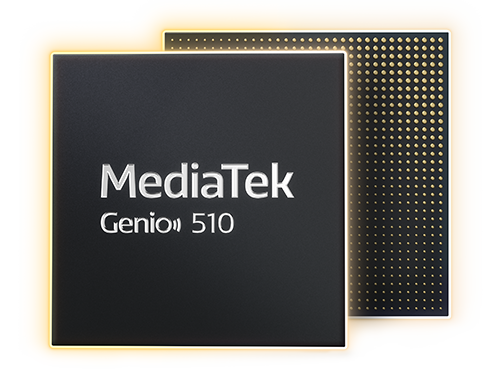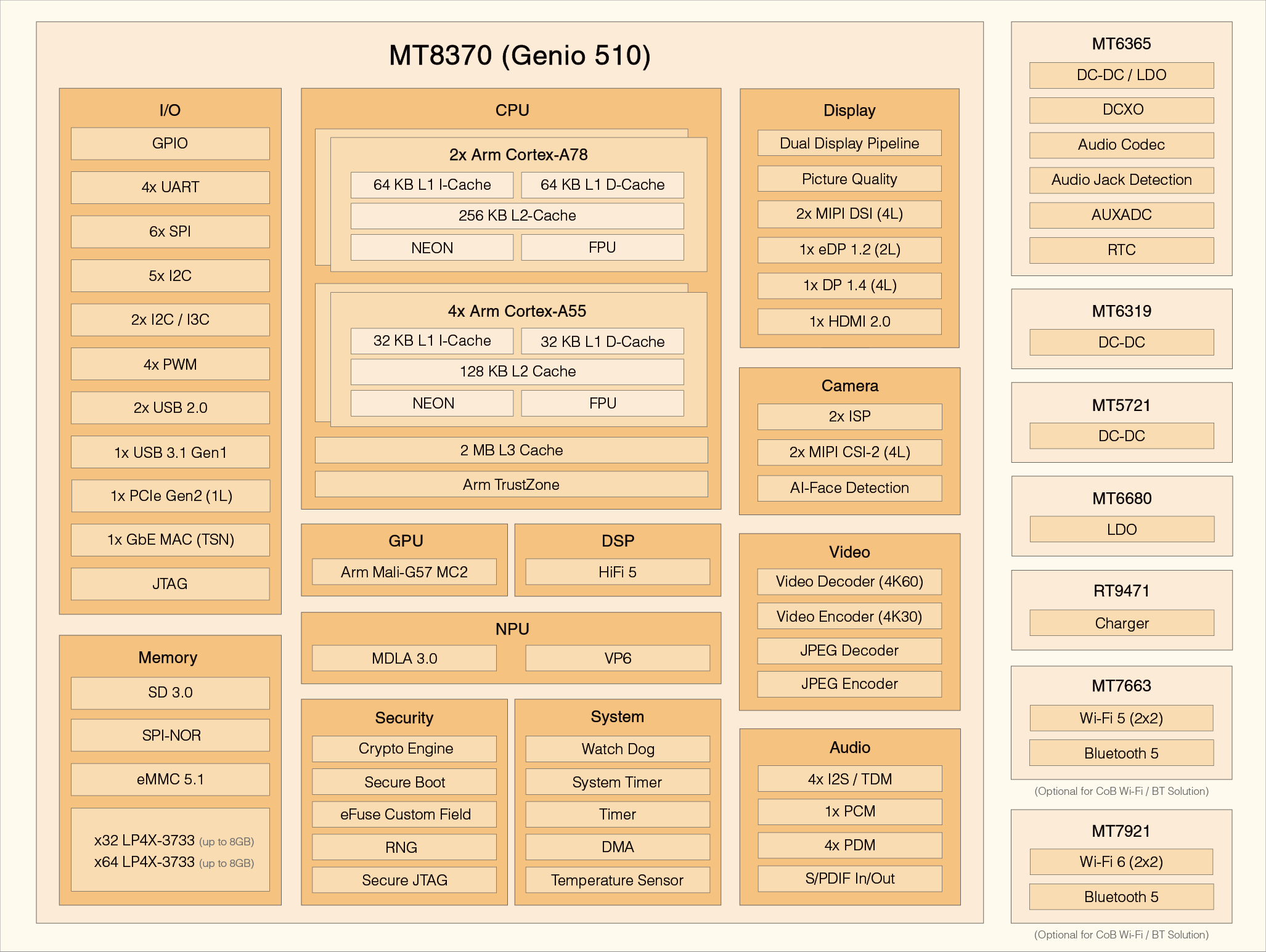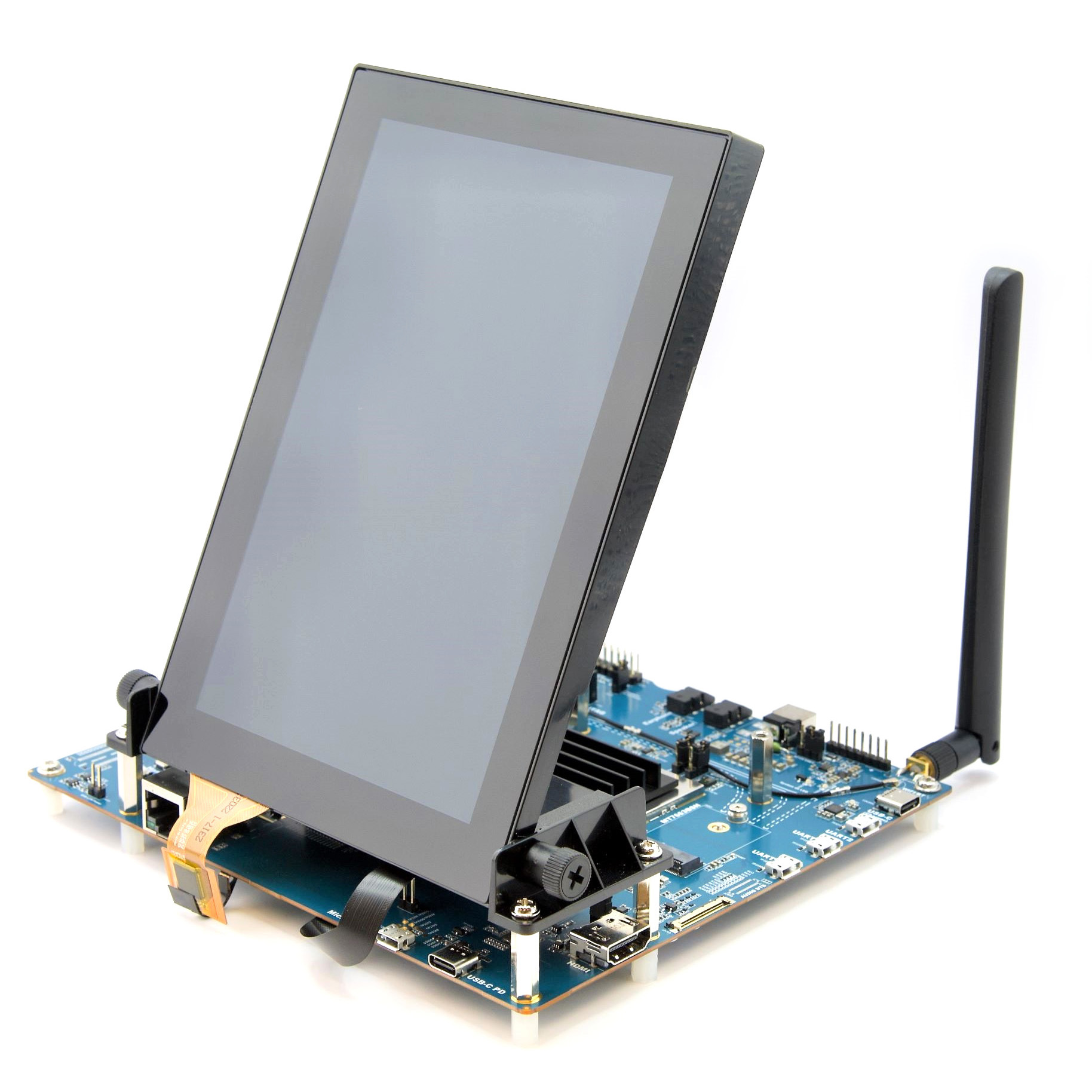MediaTek Genio 510 (MT8370)
Mainstream IOT platform for rich multimedia and edge AI applications

Overview
The MediaTek Genio 510 is a versatile, mainstream edge AI platform for demanding IoT applications. It provides a strong computing capability with a hexa-core CPU cluster, consisting of 2x Arm Cortex-A78 and 4x Arm Cortex-A55 cores; a powerful Arm Mali G57 MC2 GPU and a 5th generation MediaTek NPU (Neural Processing Unit) capable of 3.2 TOPS for edge AI acceleration. Rich multimedia applications such as smart retail, smart home, transportation, healthcare, entertainment, education, industrial and enterprise are supported by dual display capability, integrated camera ISP supporting up to 32MP@30fps, 4K video decode/encode and an integrated HiFi 5 DSP for audio algorithm processing. Low power consumption is assured by implementation on an advanced 6nm process technology.
With a rich I/O capability that includes PCIe 2.0, multiple USB and GbE MAC, and multiple UART/I2C/SPI connections, the Genio 510 provides a flexible and scalable platform for many applications. Various wireless connectivity options are supporting with external combo chips and modules including Wi-Fi 6 and Bluetooth 5 support. The Genio 510 is pin-to-pin and software compatible with the higher-performance Genio 700 allowing for a seamless upgrade path. Android, IoT Yocto, and Ubuntu OS support provides developers with the flexibility to create scalable IoT and intelligent embedded solutions.
-
Power-Efficient Edge AI Platform
2x Arm Cortex-A78 + 4x Cortex-A55 deliver high performance and power efficiency, built on TSMC 6nm process
-
Advanced AI and Neural Processing
MediaTek NPU delivers 3.2 TOPS acceleration, enabling real-time and secure edge AI inference
-
Advanced Multimedia and Graphics
Arm Mali-G57 MC2 GPU and advanced multimedia pipelines support dual 4K display and 4K video codecs
Block Diagram Expand PNG SVG
The block diagram provides a comprehensive overview of the functional blocks and interfaces of Genio 510, as well as the companion chipset that complements this SoC.
-Block-Diagram_251210-(for-web).png?language=en)
Specifications
-
Process node
6nm -
Processor (CPU)
Consumer:
2x Arm Cortex-A78 (2.0GHz)
4x Arm Cortex-A55 (2.0GHz)
Industrial:
2xArm Cortex-A78 (2.0GHz)
4x Arm Cortex-A55 (2.0GHz) -
Graphics Processing Unit (GPU)
Arm Mali-G57 MC2 950MHz
OpenGL ES 3.2, Vulkan 1.1, OpenCL 2.2 -
Neural Processing Unit (NPU)
MediaTek 5th-Gen NPU 3.2 TOPS
(1x MDLA3.0 + 1x Tensilica VP6) -
Audio DSP
Tensilica HiFi 5 -
Memory and Type
x32 LP4X-3733 (up to 8GB)
x64 LP4X-3733 (up to 8GB) -
Storage Type
eMMC 5.1
SD 3.0
SPI-NOR -
Input/Output
2x USB 2.0 (Host/Device)
1x USB 3.2 Gen1 (Host/Device)
1x GbE MAC (TSN)
1x PCIe 2.0 (1L, RC)
4x UART
5x I2C, 2x I2C/I3C
6x SPI Master
4x PWM -
Temperature
Consumer: -20°C to 95°C (Tj)
Industrial: -40°C to 105°C (Tj) -
Package Type
VFBGA -
Package Dimension
15 x 15 x 0.9 mm, 0.4 mm ball pitch -
Display Interface
2x MIPI-DSI (4L, 1.2Gbps/L)
1x eDP 1.2 (2L)
1x DP 1.4 (4L)
1x HDMI 2.0 -
Display Controller
Dual Display, Max. 4K60+4K30
Single Display, Max. 4K60
(Support PQ/HDR10/HDR10+/HLG) -
Video-in Interface
2x MIPI CSI-2 (4L)
(Virtual Channel: 8x FHD30) -
Image Signal Processor
2x ISP (3A, NR, AI-FD, LSC, HDR, Warp Engine)
Single camera: 32MP @ 30fps
Dual camera: 16MP + 16MP @ 30fps -
Video Decode
H.264/H.265/VP9/AV1 (4K60)
MPEG4/VP8 (FHD60) -
Video Encode
H.264/H.265 (4K30) -
JPEG Decode
250 MP/s -
JPEG Encode
250 MP/s -
Audio
2x I2S/TDM input
2x I2S/TDM output
4x PDM input
1x PCM input/output
1x SPDIF input, 1x SPDIF output -
Security
ARM TrustZone
Security Boot (RSA4096)
Crypto Engine
RNG
Applications
The Genio 510 SoC is built to support an extensive range of IoT applications, ensuring high levels of security, dependable stability, robust performance, and versatile flexibility to address the needs of different use cases.
-

Smart Home
Smart Appliances
Smart Fitness
Personal Assistant
Energy Management -

Industrial
Automation
HMI
Gateways
Predictive Maintenance
Vision Inspection -

Smart Retail
POS
AIDC
Inventory Management
Self Checkout
Smart Shelf -

Enterprise
Video Conferencing
Digital Signage
Smart Display
Access Control -

Healthcare
Patient Monitoring
Remote Healthcare
Medical Imaging -

Entertainment
Gaming
Controller
Video Streaming
Media Player -

Education
Interactive Whiteboard
Classroom Analytics
Digital Learning -

Smart Cities
Smart Lighting
Smart Surveillance
Smart Parking
EV Charging
Environmental Monitoring
Operating Systems
The Genio 510 SoC supports multiple operating systems to meet the diverse needs of different application scenarios, software maintenance policies, customization flexibility, and memory footprint constraints, accommodating various levels of system complexity, user interfaces, and development environments.
Evaluation Kits
The Genio 510-EVK (Evaluation Kit) is a fully functional hardware platform designed to comprehensively validate all features of the SoC. Pre-built images of various operating systems are provided for thorough evaluation. The Evaluation Kit facilitates rapid prototyping, accelerates development cycles, and enables performance benchmarking, making it an essential tool for developers to optimize their applications and validate their hardware designs.
| Product | Features | Purchase |
|---|---|---|
|
Product

|
Features
|
Purchase
|
FAQ
What is the longevity and supply plan for Genio 510?
MediaTek provides long-term availability for the Genio 510 to meet industrial and embedded application requirements. The Genio 510 SoC was initially released in Q1/2024 and has a standard product lifecycle of 10 years, with an expected end date in 2034.
Which operating systems are supported by Genio 510?
Genio 510 is officially supported with Android and Yocto from MediaTek. Support for Ubuntu and AOSP is provided through our partners.
Are all hardware features of Genio 510 supported under every OS?
No. The level of hardware feature support depends on the specific operating system, software stack, and frameworks in use. Please confirm the details of the OS in use.
Where can I find the AI performance results of Genio 510?
AI performance results for Genio 510 are available at the ETH Zurich AI Benchmark, which provides test scores and comparisons for popular AI models.
Are Genio 510 kernel drivers upstreamed to mainline Linux?
Many Genio 510 drivers are continuously upstreamed through cooperation with partners and the open-source community. Mainline Linux boots successfully and Kernel CI is used for ongoing integrity validation.
Are there any important Genio 510 kernel drivers that cannot be upstreamed?
Yes. Some drivers cannot be upstreamed.
- Video (stateful) drivers: These rely on a userspace driver (VPUD) and will not be upstreamed.
- ISP drivers: These are MediaTek proprietary driver and will not be upstreamed.
- NPU drivers: These are MediaTek proprietary driver and will not be upstreamed.
- GPU drivers: These are third-party IP and will not be upstreamed by MediaTek.
Are there any open-source solutions for video and GPU acceleration?
Yes. There are community-maintained open-source drivers available, such as stateless video codec drivers and the Panfrost GPU driver (for Arm Mali GPUs). Our software partners, like Collabora, may provide professional support and long-term maintenance services to enable these solutions for your projects. Please note that feature coverage and stability may differ from proprietary drivers.
Does Genio 510 pin-to-pin comptabile with Genio 700?
Yes. Genio 510 is fully pin-to-pin compatible with Genio 700, enabling easy upgrades or migration between the two platforms.
Does Genio 510 pin-to-pin comptabile with Genio 520?
No. Genio 510 is not pin-to-pin compatible with Genio 520.
What is the major difference between Genio 510 and Genio 700?
The major differences are in the computing power of CPU, GPU and NPU.
- CPU
- Genio 510: 2x Cortex-A78 2.0GHz + 4x Cortex-A55 2.0GHz
- Genio 700: 2x Cortex-A78 2.2Ghz + 6x Cortex-A55 2.0GHz
- GPU
- Genio 510: Mali-G57 MC2 GPU
- Genio 700: Mali-G57 MC3 GPU
- NPU
- Genio 510: 3.2 TOPS
- Genio 700: 4.0 TOPS
Does Genio 510 support industrial temperature operation?
Yes. Genio 510 supports both consumer and industrial temperature grades.
- Consumer temperature: -20°C to 95°C (Tj)
- Industrial temperature: -40°C to 105°C (Tj)
Does Genio 510 support RSA3072 secure boot?
Yes. Genio 510 Boot ROM (Root of Trust) supports up to the RSA4096 algorithm. Android currently supports the RSA2048 secure boot, while Yocto, Ubuntu, and AOSP support the RSA3072 secure boot.
Do all operating systems (Android, Yocto, Ubuntu, AOSP) enable all SoC capabilities?
No, each operating system and release version has a different level of hardware feature enablement. Please refer to the Android and Yocto release notes from MediaTek, or contact the respective open source OS providers (Canonical for Ubuntu, BayLibre for AOSP) to learn the latest software enablement status for the SoC’s hardware capabilities.



